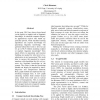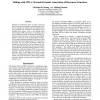56 search results - page 4 / 12 » Finite State Models for the Generation of Large Corpora of N... |
GECCO
2003
Springer
14 years 28 days ago
2003
Springer
The process of labeling each word in a sentence with one of its lexical categories (noun, verb, etc) is called tagging and is a key step in parsing and many other language processi...
COLING
2002
13 years 7 months ago
2002
It is shown that basic language processes such as the production of free word associations and the generation of synonyms can be simulated using statistical models that analyze th...
NAACL
2007
13 years 9 months ago
2007
In the past, NLP has always been based on the explicit or implicit use of linguistic knowledge. In classical computer linguistic applications explicit rule based approaches prevai...
AIIDE
2008
13 years 10 months ago
2008
Dialogue in commercial games is largely created by teams of writers and designers who hand-author every line of dialogue and hand-specify the dialogue structure using finite state...
KCAP
2011
ACM
12 years 10 months ago
2011
ACM
Wikipedia provides an interesting amount of text for more than hundred languages. This also includes languages where no reference corpora or other linguistic resources are easily ...


